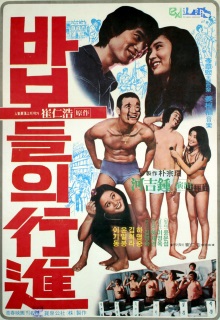
I probably got this pick from one of those lists of the best films ever made though I don’t remember which one. I do know that this is so little known outside of South Korea that it doesn’t even have its own Wikipedia page. It is however legally available for viewing on YouTube, being a project of the Korean Film Archive.
Byeong-tae and Yeong-cheol are two university students of philosophy during the time when South Korea is still under the rule of a military dictatorship. In between classes that discuss Plato and Aristotle, they get up to what fun that they can have despite not having much money. An entrepreneurial classmate organizes and sell tickets to a mass blind dating event with girls from the French literature department. The two promptly fall for their respective dates, Soon-ja and Yeong-sook. Though Byeong-tae seems serious about pursuing Soon-ja, she dismisses him as a marriage prospect for the practical reason that they are the same age and she thinks she will be too old by the time he completes military service. Yeong-cheong meanwhile lacks self-confidence and is a boring date. However when he becomes drunk, he speaks passionately about going to the East Sea and hunting a mysterious whale.
There’s very little in the way of plot in this film, feeling more like a series of unconnected vignettes about university life in the South Korea of the era. They drink, date, play sports, smoke, get up to pranks and so on. From our perspective, there’s some nostalgia value here as it all seems reminiscent of old Hong Kong films, right down to the comedic tone, fashion sense and color palette. To a Westerner, what might be striking is how comparatively mild their hijinks are. They do a respectable amount of drinking, sure, but they also get nailed by the police simply for being college-age men with long hair. In a fit of rebellion, Yeong-cheong shouts ‘ streaking’ and runs across the campus but remains fully clothed, explaining that it’s Korean-style. The farthest Byeong-tae gets with Soon-ja is stealing a kiss, for which he gets slapped. It’s entertaining and funny in a very toned down way but it doesn’t seem to be anything to get excited about.
But as usual, context is everything. Director Ha Gil-chong was laboring under a regime that would brook no dissent and had no tolerance for anything that would portray the country in a bad light. As such these relatively innocuous mischiefs were already the worst that he could get away with. All the little acts of rebellion from having long hair to getting drunk and breaking curfew carry more meaning if you see them as being directed against the regime. Yeong-cheol’s trust exercise is a lament of how the government has fostered a climate of mutual suspicion among citizens and of course there is their constant griping about the lack of any hopeful future. Unfortunately there’s more than the usual loss in translation here as well. References to dreams of seagulls and whales seem to refer to specific works of literature. A simple notice that classes are suspended refers to the student protests of the time. I’m sure all this will resonate strongly with South Koreans but it’s hard for foreigners like us to work up much emotion over these references.
Still not everything here is so obscure. The joke that students of philosophy have no job prospects once they graduate is an international one. Also, having the concepts of republican government and democracy being taught in class is hardly a subtle jab. It’s easy to see why this would be considered one of the cornerstones of Korean cinema but it probably doesn’t have enough cross-border appeal to make it universally great. It is very interesting provided you have a little patience and do a bit of research on its historical background.